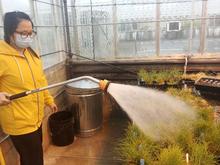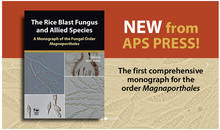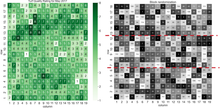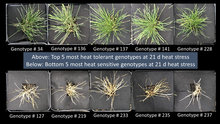Improving fine fescue disease resistance with endophytes
By Ruying “Wrennie” Wang and Alec Kowalewski, Oregon State University
The inherent disease resistance associated with fine fescues is partially the result of Epichloë endophytes. Epichloë endophytes are symbiotic fungi that live within the turfgrass and help protect the host plant from various environments stress and pathogens. Previous research has identified Epichloë endophyte strains in hard fescue that provide resistance to dollar spot and red thread diseases.
A monograph of the fungal order Magnaporthales
By Ning Zhang and Jing Luo, Rutgers University
Summer patch is a common and destructive root disease of fine fescue grasses. It causes root, crown and stem rot that develops during periods of summer stress (Smiley et al., 2005). The known causal agents of summer patch are two fungal species, Magnaporthiopsis poae and M. meyeri-festucae that belong to the order Magnaporthales (Luo et al., 2017).
Rapid detection of fine fescue root diseases
By Ming-Yi Chou, University of Wisconsin-Madison
Summer patch is a common and devastating fungal disease of fine fescues. Many major turfgrass species are susceptible to summer patch. A more thorough description of summer patch disease and the causal agents have been previously discussed. As mentioned in the articles, summer patch can be caused by several closely related fungal species and their microscopic structures are similar making it difficult to diagnose and apply targeted treatments.
Fine-grain spatial information may enhance the value of turfgrass cultivar data
By Majid Farhadloo, and Shashi Shekhar, Department of Computer Science, University of Minnesota
Thanks to NTEP-DB 1.0 [1], the relational database we created for the National Turfgrass Evaluation Program (NTEP), obtaining turfgrass cultivars' data will soon be much easier. In addition, a user-friendly web application by U-Spatial allows homeowners, researchers, and other stakeholders to extract meaningful information from NTEP data in a variety of formats. For example, retailers can learn the best cultivars to stock in different store locations around the country.
Genotypic variation in heat tolerance for hard fescues
By Cathryn Chapman, Ryan Daddio, Henry Qu, and Bingru Huang; Rutgers University
Hard fescues are often utilized for their low input maintenance requirements, but are susceptible to heat stress. With annual temperatures rising, there is both a demand for more heat-tolerant hard fescue turfgrasses and a demand for effective strategies for assessing phenotypic traits to select or screen for heat-tolerant genotypes in hard fescue.







